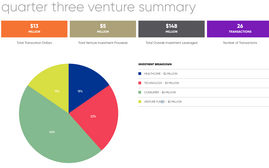Processing Your Payment
Please do not leave this page until complete. This can take a few moments.
- News
-
Editions
View Digital Editions
Biweekly Issues
- May 13, 2024
- April 29, 2024
- April 15, 2024
- April 1, 2024
- March 18, 2024
- March 4, 2024
- February 19, 2024
- February 5, 2024
- January 22, 2024
- + More
Special Editions
- Lists
- Viewpoints
- HBJ Events
- Business Calendar
- Custom Content
Angel tax credit change spooks investors

State lawmakers are backing off a plan to extend the state's angel investor tax credit program to venture capital firms, after concerns were raised that the move would dry up funding for smaller companies.
The program, which is due to expire next year, allows eligible angel investors to take a credit against their Connecticut state income tax for certain investments in start-up businesses. The tax credit equals 25 percent of the cash investment, up to $250,000.
The Commerce Committee was working on a bill that would make the tax credit a permanent part of the state tax code and extend the program to include venture capital firms.
But the proposal spooked the angel investor community, which raised concerns that the change would encourage fewer, larger investments and dry up funding for the earliest stage companies that the tax credit was originally meant to benefit.
Connecticut Innovations (CI), the state's quasi-public investment arm that runs the angel investment program, raised the biggest objections.
"To add a large user will drive out smaller investors from the program," said Claire Leonardi, CI's CEO.
Joe DeMartino, the managing director of the state's Angel Investor Forum, said typically angel investors place the earliest, most risky bets on start-ups in the $25,000 to $100,000 range, while venture capital firms make larger, later stage investments, often running into the millions of dollars
If both classes of investors were given access to the same pool of credits, which are currently capped at $6 million, the funds "would be chewed up quickly," DeMartino said, with possibly as few as six deals being financed annually.
Both DeMartino and Leonardi said they aren't necessarily opposed to giving venture capital firms access to the tax credit, but the cap would need to be increased significantly so that smaller deals don't get bumped out of the market.
However, State Sen. Gary LeBeau, an East Hartford Democrat and co-chair of the Commerce Committee, said finding the funds to expand the pool isn't a possibility right now.
"We have to be careful given the frugality of the budget," LeBeau said.
The cap on the tax credit has stood at $6 million per year, but that is expected to be cut in half in fiscal 2014. So far, the highest amount of tax credits claimed in any single year has been around $3 million.
LeBeau said lawmakers have backed off trying to extend the program to venture capital firms. However, the Commerce Committee did recently pass a revised bill that would make the angel investor program permanent.
"We took out the extension to venture capital companies," LeBeau said. "We thought it would take away too many dollars from the program."
Angel investing has become increasingly popular in recent years, especially after the dot-com bust scared venture capitalists away from early-stage deals, creating a major funding gap for start-ups.
Obtaining financing for start-up companies in Connecticut has been a particular challenge, which is why lawmakers adopted a tax credit program in 2010. It allows angel investors to take a credit against their income tax for certain investments made in bioscience, advanced materials, information technology and emerging technology businesses.
Qualifying businesses must have gross revenues under $1 million in their most recent income year, have fewer than 25 employees — at least three-fourths of who live in the state — and have been in operation in Connecticut for less than seven consecutive years.
According to CI, 90 angels have made more than 200 investments in more than 50 companies since the program's inception. The average investment is about $120,000.
CI administers the program on the state's behalf.
Related Content

2022 Giving Guide
This special edition informs and connects businesses with nonprofit organizations that are aligned with what they care about. Each nonprofit profile provides a crisp snapshot of the organization’s mission, goals, area of service, giving and volunteer opportunities and board leadership.
Learn more
Subscribe
Hartford Business Journal provides the top coverage of news, trends, data, politics and personalities of the area’s business community. Get the news and information you need from the award-winning writers at HBJ. Don’t miss out - subscribe today.
Subscribe
2024 Book of Lists
Delivering Vital Marketplace Content and Context to Senior Decision Makers Throughout Greater Hartford and the State ... All Year Long!
Read Here-
2022 Giving Guide
This special edition informs and connects businesses with nonprofit organizations that are aligned with what they care about. Each nonprofit profile provides a crisp snapshot of the organization’s mission, goals, area of service, giving and volunteer opportunities and board leadership.
-
Subscribe
Hartford Business Journal provides the top coverage of news, trends, data, politics and personalities of the area’s business community. Get the news and information you need from the award-winning writers at HBJ. Don’t miss out - subscribe today.
-
2024 Book of Lists
Delivering Vital Marketplace Content and Context to Senior Decision Makers Throughout Greater Hartford and the State ... All Year Long!
ABOUT
ADVERTISE
NEW ENGLAND BUSINESS MEDIA SITES
No articles left
Get access now
In order to use this feature, we need some information from you. You can also login or register for a free account.
By clicking submit you are agreeing to our cookie usage and Privacy Policy
Already have an account? Login
Already have an account? Login
Want to create an account? Register
Get access now
In order to use this feature, we need some information from you. You can also login or register for a free account.
By clicking submit you are agreeing to our cookie usage and Privacy Policy
Already have an account? Login
Already have an account? Login
Want to create an account? Register









0 Comments